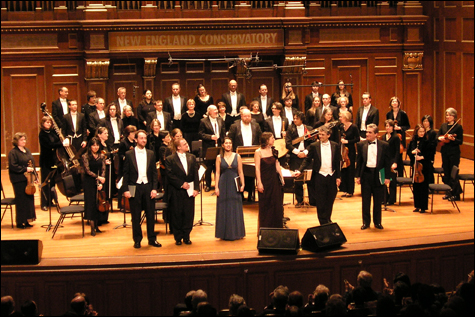
KING ARTHUR: Martin Pearlman led with charm, delicacy, outbursts of vigor, and an uninterrupted
connection with Purcell’s irresistible melodies. |
It’s been a joy to see James Levine back on the Symphony Hall podium, looking in robust health and conducting the Boston Symphony Orchestra with his admirable combination of vitality and sensitivity. His latest concert began where he’d left off the previous Sunday afternoon, with Schubert. His piano accompaniment of German bass-baritone Thomas Quasthoff in Schubert’s great song cycle Winterreise had been a triumph. Now he led the 19-year-old Schubert’s marvelous Symphony No. 4 in C minor. (The composer himself later named it the Tragic.) The orchestra played with multi-dimensional layers and depths of sound, from the reverberant opening chord of the slow introduction through the ensuing agitation of the first movement, the lyrical unfolding — with dramatic interruption (for me the high point of the symphony) — of the second, and a Minuet (interrupted by a folk dance) and Finale so light on their feet, I had visions of a corps de ballet dancing them.
Then Quasthoff returned in a selection of five famous Schubert songs, not with piano but with orchestrations by Webern, Reger, and, of all people, Offenbach. (They’re all on his recent Schubert-lieder CD with Anne Sofie von Otter and conductor Claudio Abbado.) These orchestrations are fascinating but not nearly as piercing or poignant as Schubert’s own starker piano versions. Still, Quasthoff is a masterful and unaffected interpreter, and only one creaky high note hinted that he was under the weather. (The next day, suffering from a severe cold, he cancelled his remaining concerts, one of them at Carnegie Hall, and returned to Germany.)

The Offenbach was the famous “Ständchen” (“Serenade”), with charming guitar-like pizzicati. Webern’s lean and sinuous winds gave an insinuating irony to “Tränenregen” (“Rain of Tears,” from Die schöne Müllerin), though his orchestral cushion for “Der Wegweiser” (“The Signpost”), one of the greatest Winterreise songs (“I wander on relentlessly,/Without rest, and seeking rest”), undercut the desolation. Quasthoff rose to heights of heroism and bitter sarcasm in “Prometheus” (Reger), Goethe’s condemnation of the gods. In Reger’s horror-movie wild ride for “Erlkönig” (“The Erlking”), Quasthoff was bone-chilling in the voices of seductive demon, terrified child, and falsely comforting father.
Then came the world premiere of the latest BSO 125th-anniversary commission: Symphony No. 8, for chorus and orchestra, on William Blake’s Prophetic Books, by Levine’s friend of more than 50 years, William Bolcom. Blake’s obscure long poems, frameworks for some of his greatest illustrations, have had a major influence on such modern poets as Yeats and Ginsberg, but they are not widely read and can be a shock to those who know and love The Songs of Innocence and Experience (which Bolcom has also set). They develop, often at epic length and with bewildering density, a private spiritual and political mythology, with allegorical figures named Rintrah, Orc, Urizen, Urthona, and Albion. Except for The Marriage of Heaven and Hell, with its cryptic and ironic “Proverbs from Hell” (“The road of excess leads to the palace of wisdom”), these poems don’t reduce well, which is why you don’t find them anthologized. Or set to music.
Bolcom’s four movements excerpt three prophetic books: The Marriage of Heaven and Hell (but no proverbs), America a Prophecy, and Jerusalem The Emanation of the Great Albion. Except for brief solos, the chorus sings everything (a heavy workout for John Oliver’s intrepid Tanglewood Festival Chorus). The style is “modern rhetorical” — all-too-familiar-sounding, unattractively gnarled vocal lines, often shouted. The piece begins with a ferocious bang, and many deafening crashes follow. Bolcom says that he was “after that kind of theatrical style that one finds in Blake, the phantasmagorical, that supersaturation of color and emotion.” There are a few appealingly quiet interludes (flute and vibes at the beginning and the end of the slow third movement); the mysterious, percussion-only beginning of the second movement creates an intriguing sound world.
But the symphony as a whole is a dissatisfying combination of the obvious and the impenetrable. There are blatant musical gestures: fortissimo explosions on words like “rages,” “terror,” and “howling”; a whispered “silent.” Blake’s long lists suggest no musical distinctions: “helms, and shields, and chariot horses, elephants: banners, castles, slings and rocks” all sound the same. I’m pretty familiar with these poems, and I tried valiantly to follow the text, but I couldn’t determine what the raging was all about. The opaque wall of choral singing was more a barrier than an invitation to enter the poems, and the musical bombast had no personality. If I hadn’t known, I doubt I could have guessed the composer was Bolcom.
Worst of all were the last few minutes, a turgid exercise in aggressively insistent affirmation — the relentless repetition, on an upward spiral, of Blake’s phrase “For every thing that lives is Holy.” It reminded me of Leonard Bernstein’s “Make our garden grow,” the uplifting finale of Candide, which was perhaps an unconscious model for Bolcom but — though also corny — at least has an unforgettable tune.